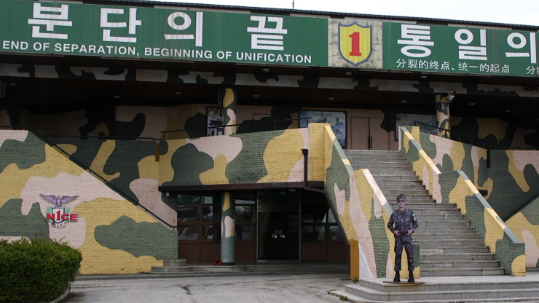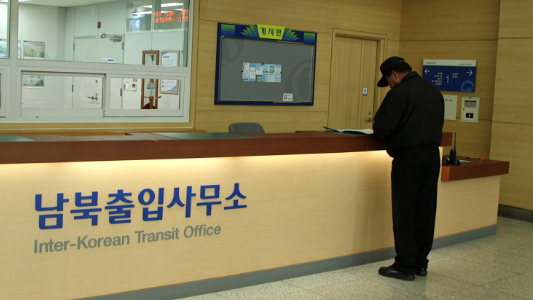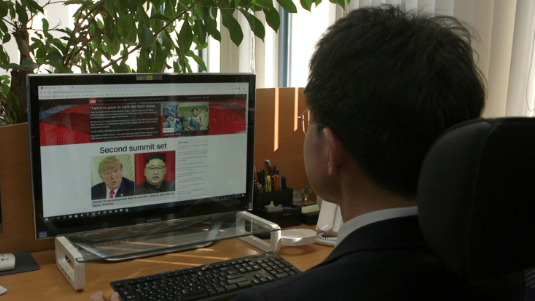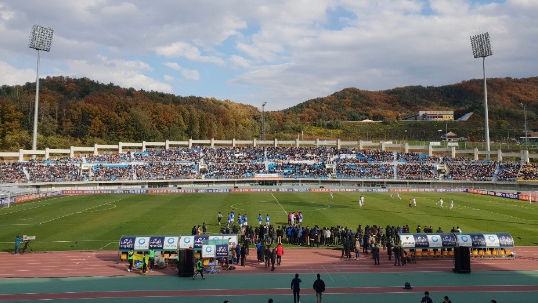
Asia Pacific
15:55, 22-Feb-2019
Beyond Hanoi summit: Elusive DPRK, ROK economic ties
Updated
22:55, 25-Feb-2019
By Jack Barton
02:10

From the Winter Olympics to cultural exchanges and a dramatic de-escalation along the demilitarized zone (DMZ), 2018 marked the deepest thaw in inter-Korean ties since the Korean Peninsula was divided at the end of World War II.
Pyongyang and Seoul are now seeking to develop economic cooperation, starting with reopening the Kaesong joint industrial zone just north of the DMZ.
Seoul ordered 123 companies of the Republic of Korea (ROK) to halt operations at Kaesong in 2016 as a response to increased weapons testing by Pyongyang.

A customs office for the Kaesong Industrial Complex remains symbolically open, though the complex itself is closed. /CGTN Photo
A customs office for the Kaesong Industrial Complex remains symbolically open, though the complex itself is closed. /CGTN Photo
There is also a push to restart tours to Mt Kumgang, located just north of the DMZ, halted in 2008 after a tourist from the ROK was shot dead.
Some analysts, including government advisers, believe both projects are possible if there is a breakthrough between Democratic People's Republic of Korea (DPRK) leader Kim Jong Un and U.S. President Donald Trump at their planned Hanoi summit.
"I think it is possible after the Vietnam summit to open Kaesong and Kumgang," said Cho Han-bum, an analyst at the state-run Korea Institute for National Unification, adding that "it's sanctioned by the Korean government, so if the Trump government permits the lifting of sanctions by the Korean government then it is possible."
Others insist international sanctions do apply.
"Kumgang mountain or the Kaesong Industrial Complex are almost impossible under the current sanctions regime," said Woo Jung-yeop, a visiting Research Fellow at the Sejong Institute's Department of Security Strategy Studies.

People of the ROK believe deeper economic cooperation with Pyongyang carries risks as well as potential high rewards. /CGTN Photo
People of the ROK believe deeper economic cooperation with Pyongyang carries risks as well as potential high rewards. /CGTN Photo
Though Woo believes there is potential for limited economic cooperation.
"There are certain areas where the ROK can provide the DPRK with certain things like humanitarian aid or certain projects that relate to the humanitarian part of the DPRK's economy," said Woo.
President Moon Jae-in recently discussed the idea of easing sanctions to allow inter-Korean cooperation with Trump during a phone conversation.
Moon also wishes to begin work on a multi-billion-U.S.-dollar project to upgrade DPRK's road and rail networks, which could link the ROK, China, Russia and beyond.

A friendly ROK-DPRK football match in Seoul, ROK. /CGTN Photo
A friendly ROK-DPRK football match in Seoul, ROK. /CGTN Photo
Some ROK scholars worry Moon might be pushing too hard.
"What I'm afraid of is that despite the UN sanctions, there is a chance the ROK government tries to bypass some of these sanctions to work with the DPRK. I think that would be disastrous. Not only for the DPRK, but also for the ROK," said Kim Bow-on, a professor of economics at Seoul's KAIST Business School.
However, Kim believes that the benefits would be huge if the DPRK gets serious about denuclearization.
"There is huge potential because these two economies can complement each other and supplement each other. So I think the short-term gain will be enormous if we plan very well," said Kim.
There are likely to be more advances in inter-Korean ties ahead.
But, without a big breakthrough in Vietnam the sort of cooperation Seoul and Pyongyang are seeking is likely to remain elusive.
(Cover: A DPRK observation building in the DMZ on Highway 1. /CGTN Photo)

SITEMAP
Copyright © 2018 CGTN. Beijing ICP prepared NO.16065310-3
Copyright © 2018 CGTN. Beijing ICP prepared NO.16065310-3